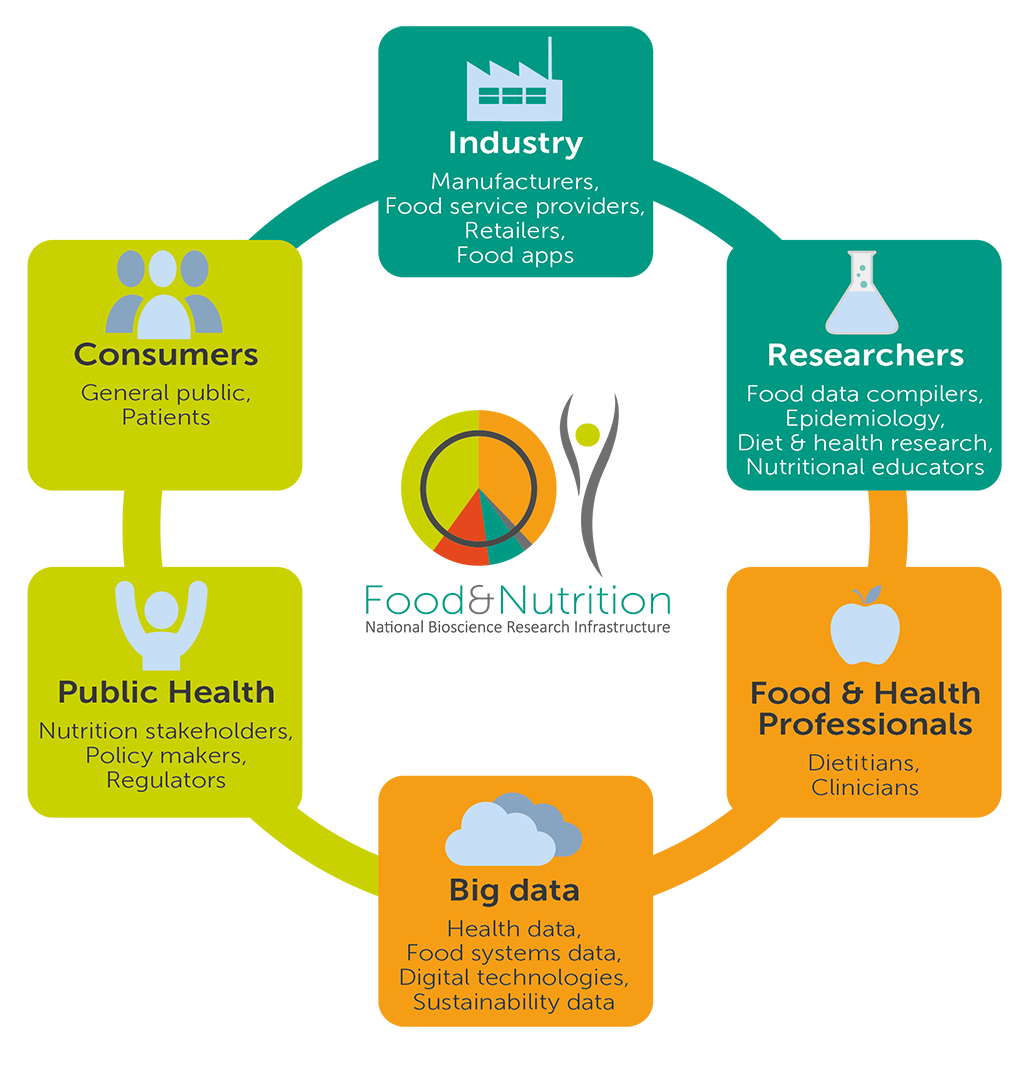
About Food & Nutrition NBRI
Food & Nutrition NBRI is a vital national and international resource providing expertise and accurate data/ information essential for high-quality research on relationships between diet and health and delivery of key national strategic aims that support adoption of healthier and sustainable diets.
Food & Nutrition NBRI acts as a national coordinating ‘hub’, actively engaging and collaborating nationally and internationally with strategic partners and research communities and informing government policy around diet and health.

WHO USES OUR WORK?
Our data, databases and tools are used extensively by academia, industry, healthcare, government, consumers.
Food composition data are the fundamental evidence base for nutrition science and extensively used across multiple fields, both nationally and internationally, including dietetics, food technology, biomedical research, and public health policy.
Our data, databases and tools underpin the understanding of the relationships between diet and health and the patterns in food composition and consumption, essential for the development of nutrition‐based health programmes and research into healthy and sustainable diets.
In addition, they are vital in supporting innovation to deliver nutritious and sustainable food, and healthier food products.
NOW AND INTO THE FUTURE
Food & Nutrition-NBRI will enable the UK to deliver nutritional policy and world-leading science in support of current and emerging national strategic needs in nutrition (food composition and intake), health (e.g., obesity, healthy ageing) and sustainability (environment, food security). It will continue to add new food data and tools to meet the needs of researchers within Quadram Institute Bioscience and more widely across food biosciences in the UK.
It will provide training and capacity development for key users in food and public health, and regularly engage with end-users, stakeholders, and other potential beneficiaries to ensure knowledge exchange.
Our ambition is to achieve impact that benefits the UK population, by supporting high quality research and innovation on healthy and sustainable diets, and digital resources to facilitate the transition.
Key objectives
Data
Objective: To provide improved delivery and coverage of food composition data covering specific nutrients and other emerging components, and other food groups of nutritional significance, as well as associated sustainability indices and food allergen information.

Networks
Objective: To extend data and tools access and capabilities to support future food and bioscience research.

Tools
Objective: To develop and apply new validated tools and methodologies for dietary assessment, and data integration for food nutrition data.

Training
Objective: To provide coordinated training to a variety of stakeholders and deliver increased stakeholder engagement and community building.
Online Food Composition Datasets
UK Composition of Foods (CoFID) – Searchable website
UK Composition of Foods (CoFID) – Excel and user guide
eBASIS – Non-Nutrients bioactive compounds Database
FoodWasteEXplorer – Food waste compositional database
Latest News
NuGO webinar – Research at the Quadram Institute
Intrigued by Research undertaken at the Quadram Institute? We are hosting a NuGO webinar on 18th November at 15:00-16:30. if you would like to attend, please register here
Full of fibre and bioactives; analysing the nutritional composition of apples
Our Food and Nutrition experts explore the fibre, vitamins and nutrients found in apples Whether you favour the sweet taste of a Gala or the sharpness of a Granny Smith, apples are a nutritious, versatile, and delicious addition to any diet. Packed with essential...
FAO, 14th International Data Conference, Rome
This week Maria, Liangzi and Robyn are attending the FAO 14th International Food Data Conference in Rome, Italy. The event aims to facilitate dialogue among technical experts on addressing critical aspects of food composition data in view of sustainable healthy diets...




